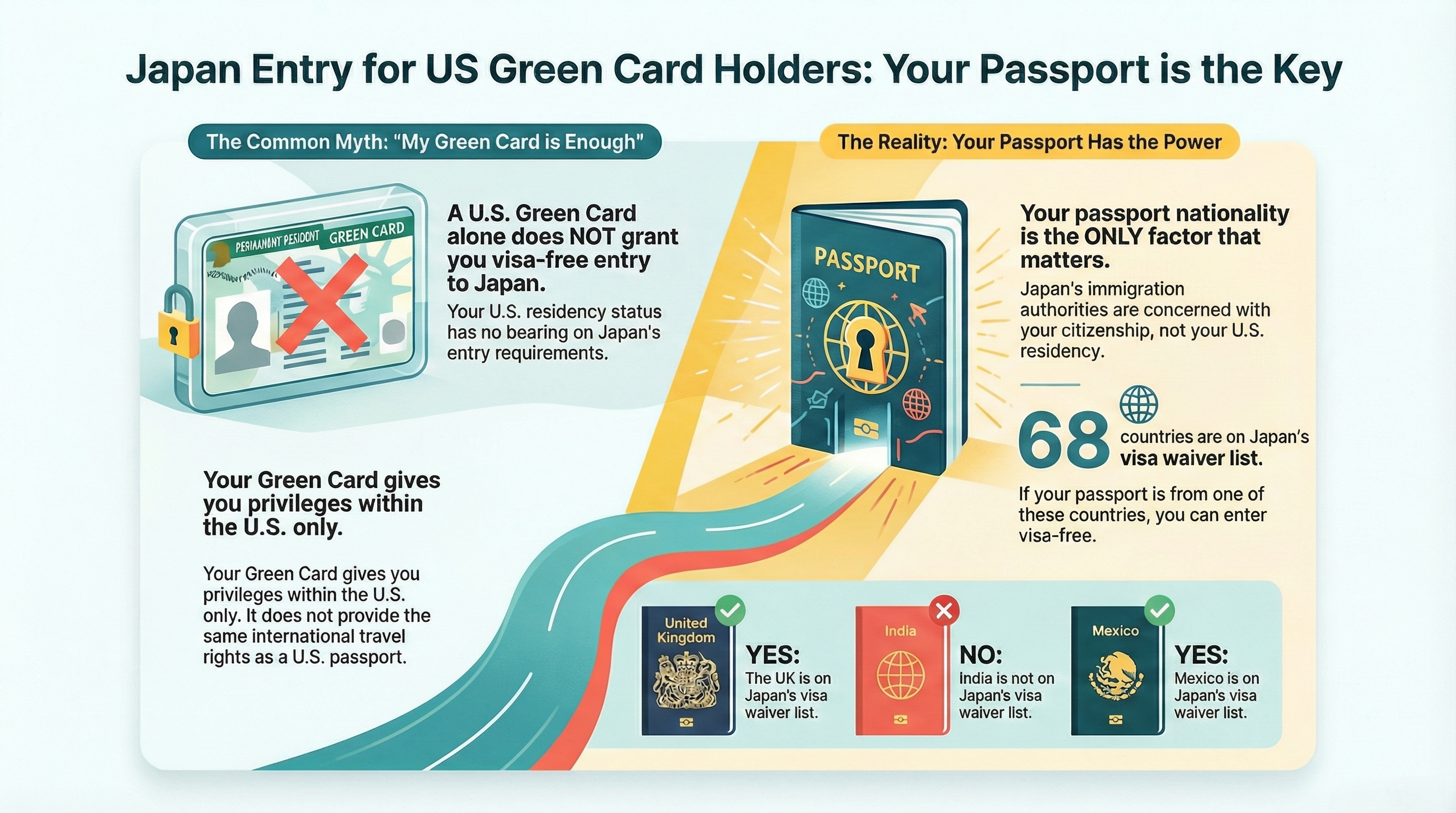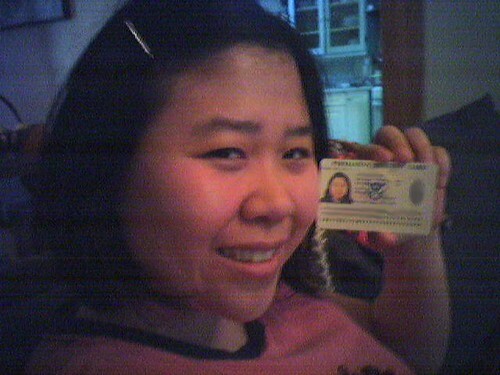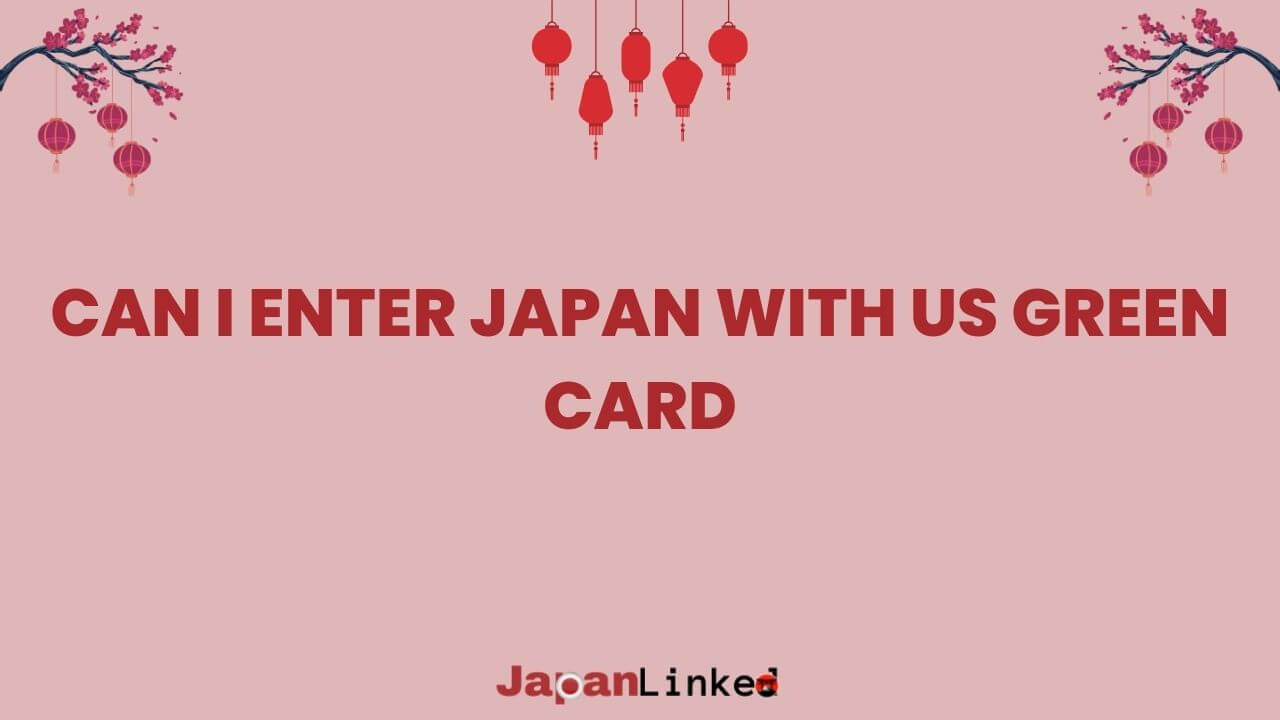Can U.S. Green Card Holders Enter Japan Without a Visa? No, a U.S. green card alone does not grant you visa-free entry to Japan.
This is one of the most common misconceptions among permanent residents of the United States planning to visit Japan.
While your green card grants you certain privileges within the United States, it has no bearing on your entry requirements for other countries, including Japan.
Your Passport Nationality Is What Matters

When it comes to entering Japan, your passport nationality—not your U.S. residency status—determines whether you need a visa. Japan’s immigration authorities are concerned with your citizenship, not with your permission to reside in the United States.
For example:
- If you hold a U.S. green card but have a British passport, you can enter Japan without a visa (as the UK is on Japan’s visa exemption list)
- If you hold a U.S. green card but have an Indian passport, you will need to apply for a visa before traveling to Japan (as India is not on Japan’s visa exemption list)
Also Read: Can You Wear Green In Japan? & Where To Buy SIM Card In Japan?
Understanding Japan’s Entry Requirements

Japan maintains a visa waiver program that allows citizens from 68 countries and regions to enter Japan for short-term stays (typically 90 days or less) without obtaining a visa.
These visitors are granted “temporary visitor” status upon arrival, provided they meet certain conditions:
- Valid passport
- Confirmed return/onward ticket
- Proof of sufficient funds for the stay
- No criminal record or previous immigration violations in Japan
Also Read: Can You Use Credit Card In Japan? & Can You Use Debit Card In Japan?
Common Misconceptions About Green Cards and Japan Entry

Many green card holders mistakenly believe that their U.S. permanent residency extends certain travel privileges to other countries. Here are some clarifications:
| Misconception | Reality |
|---|---|
| “My green card allows me to enter Japan without a visa” | False. Your passport nationality determines visa requirements |
| “As a green card holder, I have the same travel privileges as U.S. citizens” | False. U.S. citizens can enter Japan visa-free, but green card holders must check based on their passport |
| “I can apply for a visa with just my green card” | False. You need a valid passport from your country of citizenship to apply for a Japanese visa |
| “The visa process is the same for all green card holders” | False. Requirements vary based on your nationality, purpose of visit, and length of stay |
Remember: Always check the current visa requirements based on your specific passport nationality before planning your trip to Japan. Entry requirements can change, and it’s essential to have the most up-to-date information for your travel planning.
Also Read: Can You Use Wise Debit Card In Japan? & Where Can You Use Suica Card In Japan?
Understanding Japan’s Visa Waiver Program

Japan’s Visa Waiver Program allows citizens from 68 countries and regions to enter Japan without obtaining a visa in advance. This program is designed to facilitate tourism and short-term business visits while maintaining secure borders.
Countries Eligible for Visa-Free Entry
Citizens of the following countries can enter Japan without a visa for short-term stays:
| Region | Countries |
|---|---|
| North America | United States, Canada |
| Europe | United Kingdom, All EU member states, Switzerland, Norway, Iceland, etc. |
| Asia | South Korea, Taiwan, Hong Kong, Singapore, Malaysia, Thailand, etc. |
| Oceania | Australia, New Zealand |
| Middle East | Israel, United Arab Emirates, Qatar |
| Latin America | Mexico, Brazil, Argentina, Chile, etc. |
Important note for green card holders: The visa waiver eligibility is based on your passport nationality, not your U.S. residency status. A U.S. green card alone does not qualify you for visa-free entry to Japan if your passport is from a country not listed in the visa exemption arrangement.
Duration of Stay Allowed
Under the visa waiver program, eligible visitors can stay in Japan for:
- 90 days: Most eligible countries including the U.S., Canada, UK, and EU nations
- 30 days: Some countries including UAE, Thailand, and Indonesia
- 15 days: Brunei and Indonesia
These periods cannot be extended while in Japan. If you need to stay longer, you must apply for a visa before entering the country.
Purpose of Visit Restrictions
Visa-free entry under this program is limited to specific activities:
- Tourism and sightseeing
- Visiting friends or relatives
- Short-term business activities (meetings, conferences, contract signing)
- Cultural activities
You cannot engage in paid work, long-term study, or any activity that generates income while in Japan under the visa waiver program.
Verification Process at Immigration
When arriving in Japan under the visa waiver program, you’ll go through a verification process that includes:
- Fingerprint scanning and facial photograph
- Immigration interview where an officer may ask about:
- Your purpose of visit
- Length of stay
- Accommodation arrangements
- Return ticket confirmation
- Financial means to support your stay
Required Documentation
Even if you’re eligible for visa-free entry, you must present:
- Valid passport with at least 6 months validity beyond your planned departure date
- Confirmed return or onward ticket
- Proof of sufficient funds to cover your stay
- Completed disembarkation card (distributed during your flight)
- Visit Japan Web registration (recommended for faster processing)
For green card holders with passports from visa-exempt countries: Bring your green card as supplementary identification, but remember that your entry permission is based on your passport nationality.
The visa waiver program offers convenience for eligible travelers, but understanding whether you qualify based on your passport—not your green card status—is crucial for planning your trip to Japan.
How to Determine if You Need a Visa for Japan
Determining whether you need a visa to enter Japan involves a systematic approach based on several key factors. As a U.S. green card holder, your passport nationality—not your residency status—is the primary factor that determines your visa requirements.
Step-by-Step Guide to Check Your Visa Requirements
- Identify your passport nationality: The first and most crucial step is to identify which country issued your passport. This nationality—not your green card status—determines whether you need a visa.
- Check if your country participates in Japan’s visa waiver program: Japan currently allows citizens from 68 countries and regions to enter without a visa for short-term stays.
- Verify the purpose of your visit: Even if your country is on the visa exemption list, certain activities like working or studying typically require a visa regardless of your nationality.
- Confirm your intended length of stay: The visa waiver program generally allows stays of up to 90 days, though some nationalities have different time limits.
- Check for special circumstances: Certain diplomatic situations or recent policy changes may affect visa requirements for specific nationalities.
Key Factors Affecting Visa Eligibility
| Factor | Impact on Visa Requirement |
|---|---|
| Passport Nationality | Primary determining factor; citizens of 68 countries may qualify for visa waiver |
| Purpose of Visit | Tourism and business typically easier than work or study |
| Length of Stay | Stays beyond 90 days almost always require a visa |
| Immigration History | Previous overstays or violations may affect eligibility |
| Current Diplomatic Relations | Political situations can change visa requirements |
Common Scenarios for Green Card Holders
Scenario 1: Green Card Holder with UK Passport
Maria is a British citizen living in the U.S. with a green card. Since the UK is part of Japan’s visa waiver program, Maria can enter Japan without a visa for up to 90 days for tourism or business.
Scenario 2: Green Card Holder with Indian Passport
Raj holds an Indian passport and a U.S. green card. Since India is not part of Japan’s visa waiver program, Raj must apply for a Japanese visa before traveling, regardless of his U.S. permanent resident status.
Scenario 3: Green Card Holder with Mexican Passport
Carlos has a Mexican passport and a U.S. green card. Mexico is included in Japan’s visa waiver program, allowing Carlos to enter Japan without a visa for short-term tourism or business.
Scenario 4: Green Card Holder with Chinese Passport
Lin has a Chinese passport and a U.S. green card. China is not part of Japan’s visa waiver program, so Lin must obtain a visa before traveling to Japan.
Important Note: Your U.S. green card offers no advantage when entering Japan. The Japanese immigration authorities will only consider your passport nationality when determining visa requirements.
Remember that visa policies can change, and special circumstances may apply. Always verify the current requirements before planning your trip to Japan to avoid any travel complications.
Applying for a Japanese Visa: A Complete Guide
If your passport nationality requires a visa to enter Japan, you’ll need to navigate the application process carefully. Japan has modernized its visa system in recent years, introducing electronic options alongside traditional application methods.
Types of Japanese Visas
Japan offers several visa categories depending on your purpose of visit:
- Short-term stay visa (tourist) – For tourism, visiting friends/family, or business meetings
- Transit visa – For travelers passing through Japan to another destination
- Working visa – For employment purposes in specific industries
- Student visa – For studying at Japanese educational institutions
- Specified skilled worker visa – For foreign workers in designated sectors
- Highly skilled professional visa – For professionals with specialized knowledge
As a green card holder planning a vacation or short business trip, you’ll most likely need a short-term stay visa if your passport country isn’t eligible for visa exemption.
The Japan eVISA System
In 2023, Japan introduced the eVISA system to streamline the application process. This online platform allows applicants from eligible countries to apply for short-term stay visas electronically.
The eVISA system offers several advantages:
- Paperless application process
- Faster processing in many cases
- Reduced need to visit consulates in person
- Electronic visa issuance
Currently, the eVISA system is available to nationals of specific countries, with Japan gradually expanding eligibility. Check the Ministry of Foreign Affairs of Japan website to confirm if your passport nationality qualifies for eVISA application.
Required Documents for Japanese Visa Application
Whether applying online or in person, you’ll typically need to prepare:
| Required Document | Details |
|---|---|
| Valid passport | With at least 6 months validity beyond your planned stay |
| Completed visa application form | Available online or at Japanese consulates |
| Recent passport photo | Following Japanese specifications (4.5cm × 3.5cm) |
| Proof of U.S. residency | Copy of your green card (both sides) |
| Flight itinerary | Round-trip booking confirmation |
| Hotel reservations | Or invitation letter if staying with someone |
| Financial proof | Bank statements showing sufficient funds |
| Schedule of stay | Detailed itinerary of your planned activities |
| Visa fee payment | Amount varies by nationality |
Additional documents may be required depending on your nationality and purpose of visit.
Application Process Step-by-Step
For eVISA Applications:
- Create an account on the Japan eVISA portal
- Complete the online application form with your personal information
- Upload scanned copies of all required documents
- Pay the visa fee using the online payment system
- Submit your application and wait for processing
- Receive your visa electronically if approved
For Traditional Applications:
- Locate your nearest Japanese consulate or embassy
- Download and complete the visa application form
- Gather all required documents according to the checklist
- Make an appointment if required by your local consulate
- Submit your application in person or through an accredited visa agency
- Pay the application fee
- Wait for processing and return to collect your passport with visa
Visa Fees and Processing Times
Visa fees vary based on your nationality and the type of visa you’re applying for. Generally, short-term tourist visas range from ¥3,000 to ¥6,000 (approximately $20-40 USD), though some nationalities may face higher fees.
Processing times typically range from:
- 3-5 business days for straightforward eVISA applications
- 5-10 business days for standard consulate applications
- 2-3 weeks for applications requiring additional screening
Pro Tip: Apply at least one month before your planned travel date to allow for unexpected delays or requests for additional documentation.
Tips for a Successful Visa Application
- Be thorough and honest – Provide complete information and never misrepresent facts
- Submit clear, high-quality documents – Ensure all scans and copies are legible
- Follow format requirements precisely – Especially for photos and application forms
- Demonstrate strong ties to the U.S. – Show evidence of your established life in America
- Provide detailed itinerary – A well-planned trip schedule increases approval chances
- Show sufficient funds – Prove you can financially support yourself during your stay
- Apply well in advance – Don’t wait until the last minute before your trip
- Double-check all requirements – Requirements can change, so verify before submitting
Remember that having a U.S. green card can actually be beneficial during your visa application process, as it demonstrates legal residence in the United States and may be viewed favorably by Japanese immigration authorities.
Required Documentation for Japan Travel
When traveling to Japan as a U.S. green card holder, proper documentation is essential for a smooth entry process.
Immigration officials at Japanese ports of entry are thorough in their verification procedures, and being unprepared can lead to unnecessary delays or even denial of entry.
Passport Requirements
Your passport is the most critical document for entering Japan. It must meet these requirements:
- Valid for at least 6 months beyond your intended stay in Japan
- Contain at least two blank visa pages for entry/exit stamps
- Be in good condition without any damage to the cover, binding, or pages
- Match your current identity (if you’ve legally changed your name, your passport should reflect this)
Remember that your passport nationality—not your U.S. green card status—determines whether you need a visa for Japan.
Visa Documentation
If your passport nationality requires a visa for Japan, you’ll need to present:
- Your original visa (either as a sticker in your passport or an eVISA)
- Any supporting documents that were part of your visa application
- Invitation letter or guarantee letter (if applicable to your visa type)
Even if you’re from a visa-exempt country, you’ll still need to complete an Embarkation and Disembarkation Card upon arrival.
Proof of Accommodation
Japanese immigration requires clear evidence of where you’ll be staying during your visit:
- Hotel reservations with confirmation numbers
- Airbnb bookings with the host’s contact information
- Address and contact details of friends or family if staying with them
- Full itinerary if staying at multiple locations
Having digital and printed copies of these confirmations is highly recommended.
Return Ticket Evidence
To prove you don’t intend to stay in Japan indefinitely, you must show:
- A confirmed return ticket or onward journey ticket
- Complete flight itinerary showing dates of entry and departure
- E-ticket receipts with your name matching your passport
Immigration officers may specifically request this information to verify your intended length of stay matches your visa or visa waiver period.
Financial Sufficiency Proof
You must demonstrate that you can financially support yourself during your stay:
- Recent bank statements (typically from the last 3 months)
- Credit cards with sufficient available credit
- Traveler’s checks or cash in sufficient amounts
- Proof of employment or source of income (sometimes requested)
While there’s no official minimum amount required, a general guideline is approximately ¥10,000 (about $70 USD) per day of your stay.
Customs Declaration Forms
Before clearing immigration, you’ll need to complete:
- A customs declaration form listing any items of value
- Specific declarations for restricted items or large amounts of currency
- Separate forms for commercial goods (if applicable)
Be aware that Japan has strict regulations on bringing in:
- Medications (especially those containing stimulants or narcotics)
- Food products (particularly meat, fruits, and vegetables)
- Currency exceeding ¥1,000,000 (approximately $7,000 USD)
Pro Tip: Create a digital folder with all your travel documents and share it with a trusted person back home. Also keep printed copies separate from your originals in case of loss or theft.
Having all these documents organized and readily accessible will significantly streamline your entry process and help ensure a pleasant start to your Japanese adventure.
Using the ‘Visit Japan Web’ Platform
The ‘Visit Japan Web’ platform is a digital service introduced by the Japanese government to streamline the entry process for international travelers.
For U.S. green card holders and all other visitors, this platform offers significant advantages that can make your arrival in Japan much smoother.
Benefits of the Visit Japan Web Platform
The platform serves as a comprehensive pre-arrival digital processing system that allows travelers to complete several mandatory procedures before landing in Japan:
- Faster immigration processing at Japanese airports
- Paperless entry through digital documentation
- Reduced waiting times at customs and immigration
- Simplified health screening process
- Pre-approval of necessary documentation
Registration Process
Setting up your Visit Japan Web account is straightforward:
- Create an account on the Visit Japan Web platform
- Register your travel information including flight details and accommodation
- Upload a photo that meets the requirements (similar to passport photo standards)
- Complete all required forms before your departure date
- Receive QR codes for each completed procedure
The registration should be completed at least 6 hours before your flight to Japan, though completing it several days in advance is recommended.
Digital Documentation Management
Once registered, you can digitally submit and store all required entry documentation:
- Disembarkation card (traditionally filled out on the plane)
- Customs declaration form
- Health questionnaire
- Passport information
All these documents are stored securely within the platform and accessible via QR codes, eliminating the need to carry and present physical forms.
Expedited Immigration Process
One of the most valuable benefits of using Visit Japan Web is the expedited immigration process:
- Upon arrival, proceed to the designated Visit Japan Web lanes
- Present your QR codes to the automated gates or immigration officers
- Complete biometric verification (fingerprints and photo)
- Receive your entry stamp or digital confirmation
This process can save travelers 15-30 minutes during peak arrival times at major Japanese airports like Narita, Haneda, and Kansai.
Online Customs Declaration
The platform allows you to complete your customs declaration before arrival:
- Declare items that exceed duty-free allowances
- Pre-register high-value items you’re bringing temporarily into Japan
- Report any currency exceeding 1 million yen (approximately $7,000 USD)
- Submit information about food products or medications you’re carrying
After submission, you’ll receive a QR code to present at customs, allowing you to use the expedited lanes.
Health Questionnaire Completion
Since the COVID-19 pandemic, Japan has implemented health screening measures for international arrivals. The Visit Japan Web platform incorporates these requirements:
- Health status declaration
- Travel history for the past 14 days
- Vaccination information upload capability
- Contact information for tracing purposes if needed
Completing this information in advance helps prevent delays at health checkpoints in Japanese airports.
Pro Tip: Download the Visit Japan Web mobile app rather than using the browser version. The app provides offline access to your QR codes and sends helpful notifications about your entry status.
For U.S. green card holders, regardless of whether you need a visa based on your passport nationality, using the Visit Japan Web platform is highly recommended to ensure a smooth arrival experience in Japan.
COVID-19 and Current Entry Restrictions
Japan has gradually eased its COVID-19 border measures since October 2022, making travel significantly more accessible for international visitors.
As of the latest updates, entry requirements have been substantially simplified compared to the strict protocols that were in place during the height of the pandemic.
Current Health-Related Entry Requirements
Japan no longer imposes blanket COVID-19 testing or quarantine requirements for most travelers, regardless of vaccination status. The country has moved to a more normalized border control system, aligning with many other international destinations. However, it’s important to note that:
- Requirements can change quickly in response to new variants or infection surges
- Travelers from certain countries may face different restrictions based on Japan’s designation of high-risk regions
- The Japanese government maintains the right to implement emergency measures if public health concerns arise
Vaccination Status Impact
While Japan previously maintained strict vaccination requirements, the current entry policy does not differentiate between vaccinated and unvaccinated travelers for most nationalities. This means:
- Proof of COVID-19 vaccination is generally not required for entry
- Vaccination status does not currently affect quarantine requirements
- However, keeping your vaccination record readily available is still recommended as a precaution
Testing Requirements
The current testing policy is as follows:
- Pre-departure testing: Not required for most travelers
- On-arrival testing: Generally not conducted for asymptomatic travelers
- Random screening: May be implemented at ports of entry
If you display symptoms upon arrival, you may be subject to testing and potential quarantine measures at the discretion of Japanese health authorities.
Quarantine Policies
Japan’s quarantine system has evolved significantly:
| Period | Quarantine Requirement |
|---|---|
| Current | No mandatory quarantine for most travelers |
| Previous (2022) | 3-7 day quarantine based on vaccination and origin country |
| Early pandemic | 14-day strict quarantine for all arrivals |
While standard quarantine is no longer required, travelers should be aware that:
- Those testing positive upon arrival may be subject to isolation
- Close contacts of confirmed cases may face monitoring or movement restrictions
- Health officials retain authority to implement quarantine for public health reasons
Impact on Visa Processing
The normalization of border measures has also affected visa processing:
- Processing times have generally returned to pre-pandemic levels
- In-person appearances at consulates may still be required for certain visa categories
- Documentation requirements now include fewer COVID-specific items
Important: While restrictions have eased considerably, the situation remains fluid. All travelers should check the Ministry of Foreign Affairs of Japan website and Japan National Tourism Organization for the most current information before planning their trip.
Border Measure Categories
Japan maintains a classification system that can trigger different entry requirements based on your country of origin:
- Blue countries (lowest risk)
- Yellow countries (moderate risk)
- Red countries (highest risk)
This categorization determines whether additional testing or quarantine might be required, though as of this writing, most countries fall into the “Blue” category with minimal restrictions.
Always verify your country’s current classification before traveling, as these designations can change with limited notice.
Travel Tips for Green Card Holders Visiting Japan
When traveling to Japan as a U.S. green card holder, proper preparation can make the difference between a smooth journey and a stressful experience. Here are essential tips to ensure your visit goes seamlessly:
Carrying Proper Documentation
Always travel with these essential documents when visiting Japan:
- Valid passport with at least 6 months validity beyond your planned departure date
- U.S. Permanent Resident Card (Green Card)
- Japanese visa (if required based on your nationality)
- Printed hotel reservations and return flight confirmations
- Proof of sufficient funds for your stay (credit cards, bank statements, cash)
- Travel insurance documents with coverage for Japan
Keep digital copies of all documents in cloud storage and email them to yourself as a backup. Consider carrying a photocopy of your passport’s photo page and visa separate from the originals.
Embassy Registration Recommendations
Before traveling to Japan, register your trip with your home country’s embassy:
- U.S. residents should enroll in the Smart Traveler Enrollment Program (STEP) if they’re U.S. citizens
- Non-U.S. citizens should register with their own country’s embassy or consulate in Japan
- Save emergency contact information for your embassy in Japan
- Note the address and phone number of your country’s embassy in Tokyo or nearest consulate
Registration helps your embassy contact you during emergencies and provide assistance if you lose your passport or face other difficulties.
Understanding Length of Stay Limitations
Be aware of the strict time limits on your authorized stay in Japan:
- Most visa-exempt visitors receive a 90-day stay permit
- Visa holders must adhere to the specific duration granted on their visa
- Overstaying is taken very seriously in Japan and can result in fines, deportation, and future entry bans
- The immigration stamp in your passport indicates your authorized departure date
- Extensions are possible but require application at a regional immigration bureau before your authorized stay expires
“Always check the departure date stamped in your passport upon arrival and set calendar reminders several weeks before it expires.”
Re-entry Considerations
If you plan to visit neighboring countries during your stay in Japan:
- Understand the re-entry permit system if you’re on a long-term visa
- Temporary visitors (tourists) who leave Japan must typically obtain a new visa or entry permit to return
- If you’re from a visa-exempt country, you may be able to re-enter without a visa, but this will count as a new entry
- Ensure your multiple-entry visa (if applicable) remains valid for your entire travel period
- Check if your planned re-entry might affect your maximum allowed stay duration
Cultural Etiquette Notes
Respecting Japanese customs will enhance your travel experience:
- Remove shoes when entering homes, traditional ryokans, and some restaurants
- Bow slightly when greeting people (the depth and duration indicate the level of respect)
- Avoid loud conversations in public spaces, especially on trains and buses
- Learn basic Japanese phrases like “arigatou gozaimasu” (thank you) and “sumimasen” (excuse me)
- Carry a small towel as many public restrooms don’t provide paper towels
- Be mindful about tipping – it’s not customary and can sometimes be considered rude
- Follow rules and instructions carefully in public spaces
- Separate your trash according to local recycling guidelines
By following these tips, you’ll not only ensure compliance with Japan’s entry requirements but also set yourself up for a more enjoyable and culturally respectful visit to this fascinating country.
FAQs About Entering Japan with a U.S. Green Card
Can a U.S. green card holder enter Japan without a visa?
No, a U.S. green card alone does not grant visa-free entry to Japan. Your visa requirements are determined by your passport nationality, not your U.S. residency status.
If your passport is from a country on Japan’s visa exemption list (such as the UK, Canada, or Australia), you can enter without a visa. If not, you must apply for the appropriate visa regardless of having a U.S. green card.
How long can I stay in Japan if my country has visa exemption?
Most travelers from visa-exempt countries can stay in Japan for up to 90 days for tourism, business meetings, visiting friends/family, or similar activities. Some nationalities may be limited to 15 or 30 days, so check the specific allowance for your passport country.
Can I extend my stay in Japan beyond the initial period?
Yes, in some cases. You can apply for an extension at a regional immigration bureau in Japan. However, extensions are generally only granted for exceptional circumstances such as illness or unavoidable emergencies. Don’t plan your trip expecting an extension will be approved.
Do children need separate visas when traveling to Japan?
Yes, all travelers regardless of age require proper documentation. Children traveling with parents need either:
- Their own visa (if from a non-exempt country)
- Their own passport (if from a visa-exempt country)
Infants and minors are not exempt from entry requirements.
Are visa requirements different for business versus tourism?
For nationals of visa-exempt countries, both business meetings and tourism fall under “temporary visitor” status. However, if you’re from a country that requires a visa, you’ll need to apply for the specific visa type matching your travel purpose:
- Tourist visa: For sightseeing, visiting friends/family
- Business visa: For business meetings, conferences, etc.
- Work visa: Required for any paid activities in Japan
What should I do if I need to travel to Japan urgently?
For emergency situations such as a family illness or death, contact the nearest Japanese embassy or consulate immediately. Explain your situation and request expedited processing. Be prepared to provide:
- Documentation of the emergency (medical records, death certificate)
- Your complete visa application
- Evidence of your relationship to the person in Japan
Many consulates offer expedited processing for genuine emergencies, sometimes within 1-3 business days.
Can I transit through Japan without a visa?
If you’re simply transiting through a Japanese airport and not leaving the international transit area, you generally don’t need a visa regardless of nationality.
However, if you plan to exit the airport or transfer between airports (like Narita to Haneda), you’ll need to meet the standard entry requirements based on your passport.
Do permanent residents of other countries (like EU or Canada) get special consideration?
No. Similar to U.S. green card holders, permanent residents of other countries are evaluated based on their passport nationality, not their residency status elsewhere. Your passport is the only document that determines visa requirements for Japan.
What if my passport and green card have different names?
Ensure all your travel documents match. If there are discrepancies due to marriage, name change, or other reasons, bring supporting documentation such as a marriage certificate or court-ordered name change. Consider updating your documents before travel to avoid complications.
If I’m denied entry to Japan, what happens?
If Japanese immigration officials deny your entry, you’ll typically be required to board the next available flight back to your departure location. Airlines may charge you for the return ticket. To avoid this situation:
- Ensure you have all required documentation
- Be honest about your travel purpose
- Have proof of sufficient funds for your stay
- Demonstrate clear plans to return to your home country

